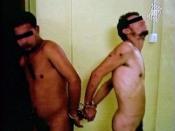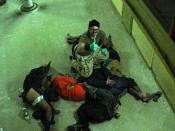Have you ever lost control? Have you ever been caught up in the moment anddone or said things that you regret? Of course, we all have, but at what point do you stop and take inventory of what you're doing and realize that it's wrong or immoral? We tend to fall into the group mentality, so that if everyone else is doing it, it's ok. If you see someone else acting immorally, when do you draw the line and say no more? Chances are you won't say or do anything, but just go with the flow and not make waves. We all like to think that we're good people, but how can we really know for sure? I am referring to the events at Abu Ghraib in November, 2003, where lack of supervision and guidelines, combined with gross dehumanization of prisoners led to one of the biggest scandals ever to hit the U.S.
military.
We like to think of our fighting men and women as the cream of the crop, our nation's finest in action. So what would people who had undergone stringent psychological evaluations and testing be doing torturing people in the most inhumane ways imaginable? Was it just a few bad apples, or could it be something more? We can get a better understanding of what happened at Abu Ghraib by taking a closer look at The Stanford Prison Experiment conducted by Dr. Philip Zimbardo in 1971. In this experiment a group of young men answered an ad in a local newspaper for research subjects to take part in a study of prison life. Seventy people answered the ad and twenty-four were finally selected to participate. Among these twenty-four half wereFarris 2selected to be prisoners by the flip of a coin, and the other half guards. The prisoners...


